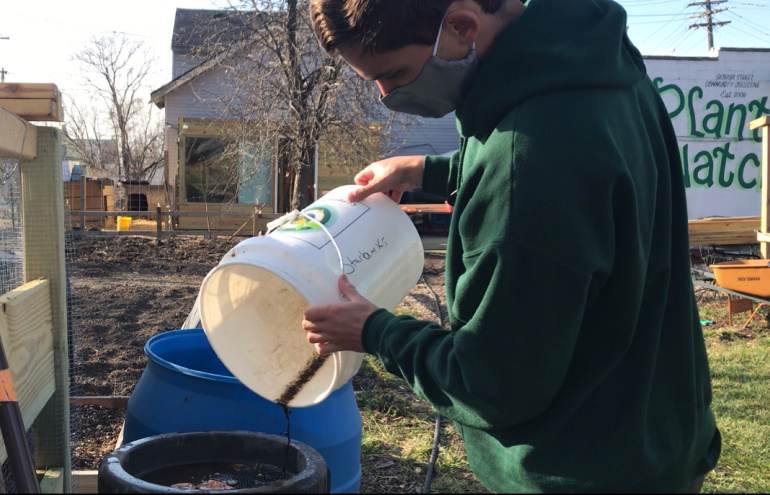
Recognizing Earth Day, which occurs on April 22 each year, has provided an opportunity for the campus community to highlight accomplishments, enjoy sustainability-focused activities and be part of the movement to protect the planet.
“This year, since most of our community is not on campus, I think it’s important to let everyone know that Wayne State continues its work to reduce the university’s impact on the environment,” said Daryl Pierson, of the Office of Campus Sustainability. “We are working in so many areas related to energy, waste reduction, sustainable food systems and transportation. It’s important to find synergies within our own work and with the work of others.”
Pierson explained there are many campus stakeholders engaged in research, academics, operations and community engagement. This activity led to the creation of Warrior Sustainability as a way to reflect the collective work of the institution’s sustainability stakeholders.
Elena Past, professor of Italian Classical and Modern Languages, Literatures, and Culture, and chair of the President’s Standing Committee on Environmental Initiatives, noted that she has observed a high level of enthusiasm in groups working on sustainability. She further explained that it is important to capture and organize all of these efforts for easy reference to those interested in learning more about sustainability at the university.
“Across the university, there's fascinating work being done in environmental sustainability, including major research projects, student and community activism, innovative teaching, and the transformation of campus landscapes and buildings. Developing a Sustainability Directory made perfect sense as a way to gather all of these efforts together in one place,” said Past. “Our campus is like a small city, and sometimes it's difficult to keep tabs on all the things that are happening. The Sustainability Directory is intended to be a portal that can tell the story of the work being done, from environmental engineering to environmental justice initiatives, from research on invasive species in the Great Lakes to storytelling projects about Detroit's water infrastructure. The directory seeks to connect people and ideas across the university.”
The President’s Standing Committee meets monthly on the third Thursday. For more information, email sustainability@wayne.edu.
Earth Day Challenge
As part of the Earth Day observance, the entire campus community is asked to participate in the Earth Day Challenge, an ongoing initiative that provides an opportunity to individually make a difference in reducing waste.
Highlights of the challenge include:
- Reduce purchasing products with plastic packaging and bags
- Purchase products with less packaging and bring your own reusable bags
- Use a personal reusable water bottle
- Use sustainable modes of transportation, such as walking, biking or public transit
- Buy local and shop secondhand
- Purchase products made with recycled content.
“Each of us can contribute towards a cleaner environment in seemingly small ways, just by following the points of the Earth Day Challenge,” Pierson said. “Collectively, we can make a remarkable difference.”
Compost Pilot
Two years ago, on Earth Day, Wayne State’s Office of Campus Sustainability issued a challenge to the campus community to help reduce the institution’s waste. The sustainability office led the way during this challenge by exploring opportunities to increase the message of waste reduction.

Pierson explained that capturing food and yard waste for a compost initiative made sense to help meet the university’s sustainability goals and increase its diversion rate. The diversion rate measures the portion of waste not sent to the landfill. Keeping track of the university’s diversion rate allows it to measure and track reduce, reuse, and recycling initiatives.
“We knew there was an opportunity to address food waste on campus,” said Pierson, “It doesn’t have to go into the garbage. It could be reused for compost.”
The topic of composting is not new to Wayne State. There were compost tumblers in the service area of Atchison and Ghafari Residence Halls adjacent to the Warrior Garden. There have also been many conversations about starting a larger compost initiative, but those talks never got off the ground.
The sustainability office worked with FoodPlus Detroit and Georgia Street Community Collective, as well as university stakeholders from Grounds and Dining Services. The group engaged in several strategy sessions to map out opportunities and potential roles for the groups to participate in an organics collection.
“This program has been unique because — unlike other composting programs on university sites — it incorporates the community and provides Georgia Street with materials needed to create nutrient-rich compost,” explained Grace Maves, an intern with the Office of Campus Sustainability.
Since the September launch of the Compost Pilot, the program has diverted more than 4,600 pounds of food waste from landfills.
For more information about the Compost Pilot Program, visit sustainability.wayne.edu.
Green Office Program
The Green Office program, launching this fall, will challenge departments to be more sustainable in their office environments. The Green Office promotes and encourages the reduction of negative environmental impacts while reducing the carbon footprint of the university.
“We believe this program will have a positive effect on sustainability actions in the workplace,” said Pierson. “By participating with Green Office, the campus community will engage in various aspects of sustainability. It will be great for awareness of one’s actions. Given the points and incentives, it should be a lot of fun.”
The program serves as an improvement tool for departments to earn points that will designate their certification level. For example, each sustainable action completed will earn tallied points to assign a certification level of bronze, silver, gold, or platinum.
“There definitely will be bragging rights involved,” said Pierson.
Look for future announcements regarding the official launch of the Green Office program. To learn more about sustainability initiatives, or subscribe to the newsletter, email sustainability@wayne.edu.
